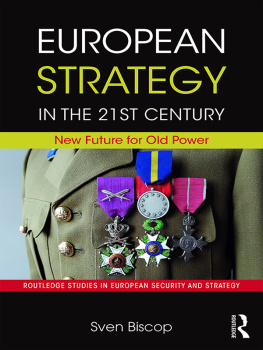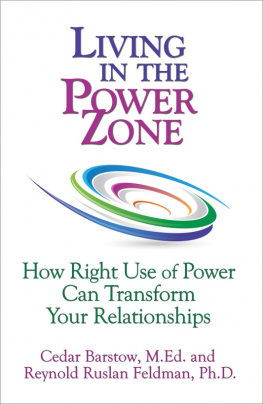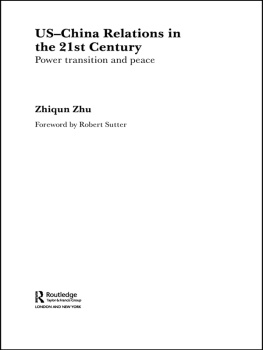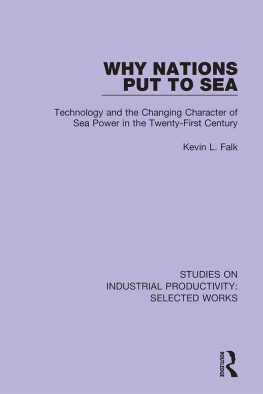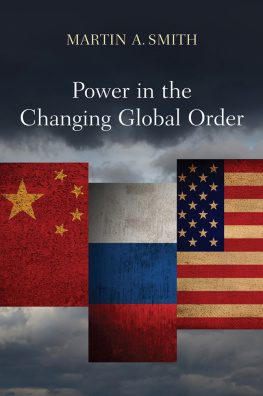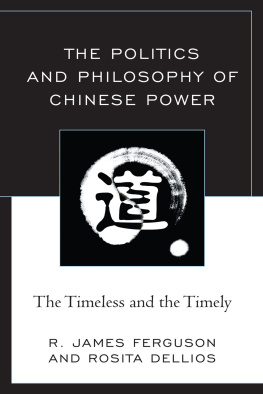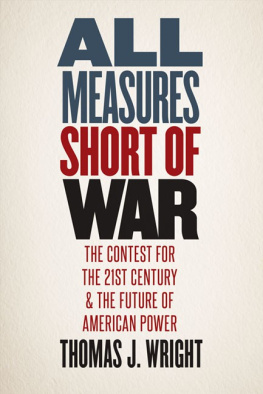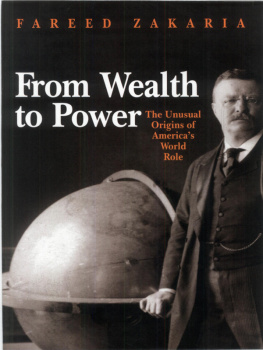THE FUTURE OF POWER
ALSO BY JOSEPH S. NYE, JR.
The Powers to Lead (2008)
The Power Game: A Washington Novel (2004)
Power in the Global Information Age:
From Realism to Globalization (2004)
Soft Power: The Means to Success in World Politics (2004)
The Paradox of American Power: Why the
Worlds Only Superpower Cant Go It Alone (2002)
Understanding International Conflicts: An Introduction to Theory and History, 7th ed. (2009)
Bound to Lead: The Changing Nature of American Power (1990)
Nuclear Ethics (1986)
Hawks, Doves, and Owls: An Agenda for Avoiding Nuclear War, coauthored with Graham Allison and Albert Carnesale (1985)
Power and Interdependence: World Politics in Transition, coauthored with Robert O. Keohane (1977; 3rd ed. with additional material, 2000)
Peace in Parts: Integration and Conflict in
Regional Organization (1971)
Pan-Africanism and East African Integration (1965)
Copyright 2011 by Joseph S. Nye, Jr.
Published in the United States by PublicAffairs, a member of the Perseus Books Group.
All rights reserved.
No part of this book may be reproduced in any manner whatsoever without written permission except in the case of brief quotations embodied in critical articles and reviews. For information, address PublicAffairs, 250 West 57th Street, Suite 1321, New York, NY 10107.
PublicAffairs books are available at special discounts for bulk purchases in the U.S. by corporations, institutions, and other organizations. For more information, please contact the Special Markets Department at the Perseus Books Group, 2300 Chestnut Street, Suite 200, Philadelphia, PA 19103, call (800) 810-4145, ext. 5000, or e-mail .
Library of Congress Cataloging-in-Publication Data
Nye, Joseph S.
The future of power / Joseph S. Nye. 1st ed.
p. cm.
Includes bibliographical references and index.
ISBN 978-1-58648-891-8 (alk. paper)
1. Power (Social sciences) I. Title.
JC330.N92 2011
303.3'3dc22
2010044581
E-book ISBN: 978-1-58648-892-5
First Edition
10 9 8 7 6 5 4 3 2 1
To Molly, as always;
to our sons, John, Ben, and Dan;
and to their childrenTupper, Hannah, Sage,
Avery, Cole, Maggie, Ellie, Brooke, and Molly
who will live in this century
CONTENTS
In his inaugural address in 2009, President Barack Obama stated that our power grows through its prudent use; our security emanates from the justness of our cause, the force of our example, the tempering qualities of humility and restraint. Similarly, Secretary of State Hillary Clinton said, America cannot solve the most pressing problems on our own, and the world cannot solve them without America. We must use what has been called smart power, the full range of tools at our disposal. What does this mean? How will power work, and how is it changing in the twenty-first century?
To answer such questions, we need to have a better understanding of power than is typical in most current discussions. Let me give two examples, one personal and one public.
More recently, in August 2008, China and Russia provided sharp contrasts in the use of power. As French analyst Dominique Moisi wrote at the time, Whereas China intends to seduce and impress the world by the number of its Olympic medals, Russia wants to impress the world by demonstrating its military superiority Chinas soft power versus Russias hard power. Some analysts concluded that the Russian invasion of Georgia proved the irrelevance of soft power and the dominance of hard military power. In reality, the story turned out to be more complicated for both countries in the long run.
Russias use of hard power undercut its claims to legitimacy and sowed fear and mistrust in much of the world. European neighbors
In contrast, China ended August with its soft power enhanced by its successful staging of the Olympic Games. In October 2007, President Hu Jintao declared Chinas intent to increase its soft power, and the Olympics were an important part of that strategy. With the establishment of several hundred Confucius Institutes to promote Chinese culture around the world, increased international broadcasting, attraction of foreign students to its universities, and softer diplomacy toward its neighbors in Southeast Asia, China made major investments in soft power. Opinion polls showed an increase in its international reputation. By accompanying its growth in hard power with an attractive soft power narrative, China was trying to use smart power to convey the idea of its peaceful rise and thus head off a countervailing balance of power.
AMERICAN POWER IN THE TWENTY-FIRST CENTURY
More generally, as the U.S. economy floundered and China continued to grow in the great recession of 20082009, Chinese authors launched a flood of declinist commentary about the US. One expert claimed that the high point of U.S. power projection had been 2000.
How can we know if they are correct or not? That question has fascinated me for two decades, and this book is the culmination of my exploring the sources and trajectory of American power. To answer the question, we need to understand better what we mean when we speak of power and how it is changing under the conditions of a burgeoning revolution in information technology and globalization in the twenty-first century. We also need to avoid certain pitfalls.
First, we must beware of misleading metaphors of organic decline. Nations are not like humans with predictable life spans. For example, after Britain lost its American colonies at the end of the eighteenth century, Horace Walpole lamented Britains reduction to as insignificant a country as Denmark or Sardinia.world of cyberinsecurity, power diffusion may be a greater threat than power transition.
At an even more basic level, what will it mean to wield power in the global information age of the twenty-first century? A second pitfall is to confuse power with the resources that states possess and to limit our focus solely to states. What resources will produce power? In the sixteenth century, control of colonies and gold bullion gave Spain the edge; in the seventeenth, the Netherlands profited from trade and finance; in the eighteenth, France gained from its larger population and armies; and in the nineteenth, Britains power rested on the nations primacy in the Industrial Revolution and on its navy. Conventional wisdom has always held that the state with the largest military prevails, but in an information age it may be the state (or nonstates) with the best story that wins., the Information Revolution and globalization are providing new power resources for nonstate actors. On September 11, 2001, a nonstate actor killed more people in New York than the state of Japan did at Pearl Harbor in 1941. This can be called the privatization of war. Today, it is far from clear how we measure a balance of power, much less how we develop successful strategies to survive in this new world. Most current projections of a shift in the global balance of power are based primarily on one factor projections of growth in the gross national product of different countries. These projections ignore the other dimensions of power discussed in this book, not to mention the difficulties of combining the different dimensions into successful strategies.
SMART POWER
Smart power is the combination of the hard power of coercion and payment with the soft power of persuasion and attraction. Soft power is not the solution to all problems. Even though North Korean dictator Kim Jong-Il watched Hollywood movies, that had little effect on North Koreas nuclear weapons program. And soft The Smart Power Commission was not alone in this conclusion, and others have joined the call for smart power strategies.
Next page

